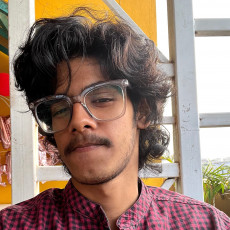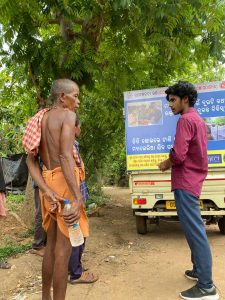Vesthi has long been a traditional dressing style for the tribal people of Odisha. It consists of a long piece of cotton cloth that is wrapped around the waist and lower body.
This style of dressing suits the climate because it helps to reduce the heat around the body while the thin fabric keeps the wearer cool. It is also ideal for agriculture in the paddy fields because it allows the worker to keep dry while standing in deep water and work quickly (which helps him to lose excess weight!).
Finally, we should note that the Vesthi embodies masculinity and is viewed by some as a symbol of dominance and authority. More often than not the wear of the cloth will also sport a mustache, which he proudly twirls.
Vesthi has been part of tribal culture for ages, but this way of dressing can also lead to illness and disease, which causes mayhem in the community. Mosquito-borne diseases are particularly dangerous.
Paddy fields are full of stagnant water and serve as an excellent breeding ground for mosquitos who feast upon the workers. Lacking a proper dress code, the workers fall victim to diseases like malaria, dengue, filariasis, etc.
It seems obvious, but are the trial communities aware of the threat from these tiny insects?
Unfortunately no. Often, if a worker gets ill from malaria he will view it as a regular fever and send his family members to the paddy fields where they too will become infected. Of course, they do not need to plant and harvest rice to get stung by mosquitos and fall sick. Making matters worse, they are probably not aware of the risk and fail to seek medical help. This further worsens their sickness and can lead to death.
Is there any way to bring about a change? The answer is yes. Prevention may be better than cure, but the tribal dress code – to take one example – is deeply embedded in tribal culture. How do we help tribals to change dangerous habits and use safer methods?
Persuading someone to protect him or herself by covering their body doesn’t seem like a Herculean task. Really, how tough can it be to wear a pair of trousers instead of a piece of cloth? Well, it is hard! These tribal people may be welcoming and caring, but the moment you propound a new lifestyle, they go wild! It’s not about an article of clothing so much as their culture, which is intensely important to them. They identify through their culture and traditions and are proud of them.
How do we get around this? In my view, by appealing to young tribal people. While young tribals are also proud of their traditions, they are also keen to learn about the modern world. They understand how a style of living might also be dangerous. They are open to suggestions about how a safe lifestyle could go along with respect for the traditions and culture that are vested in their souls. They are also driven by the spark of curiosity. This can be a weapon in our fight against malaria.
Posted By Rohit Samal
Posted Nov 2nd, 2023


